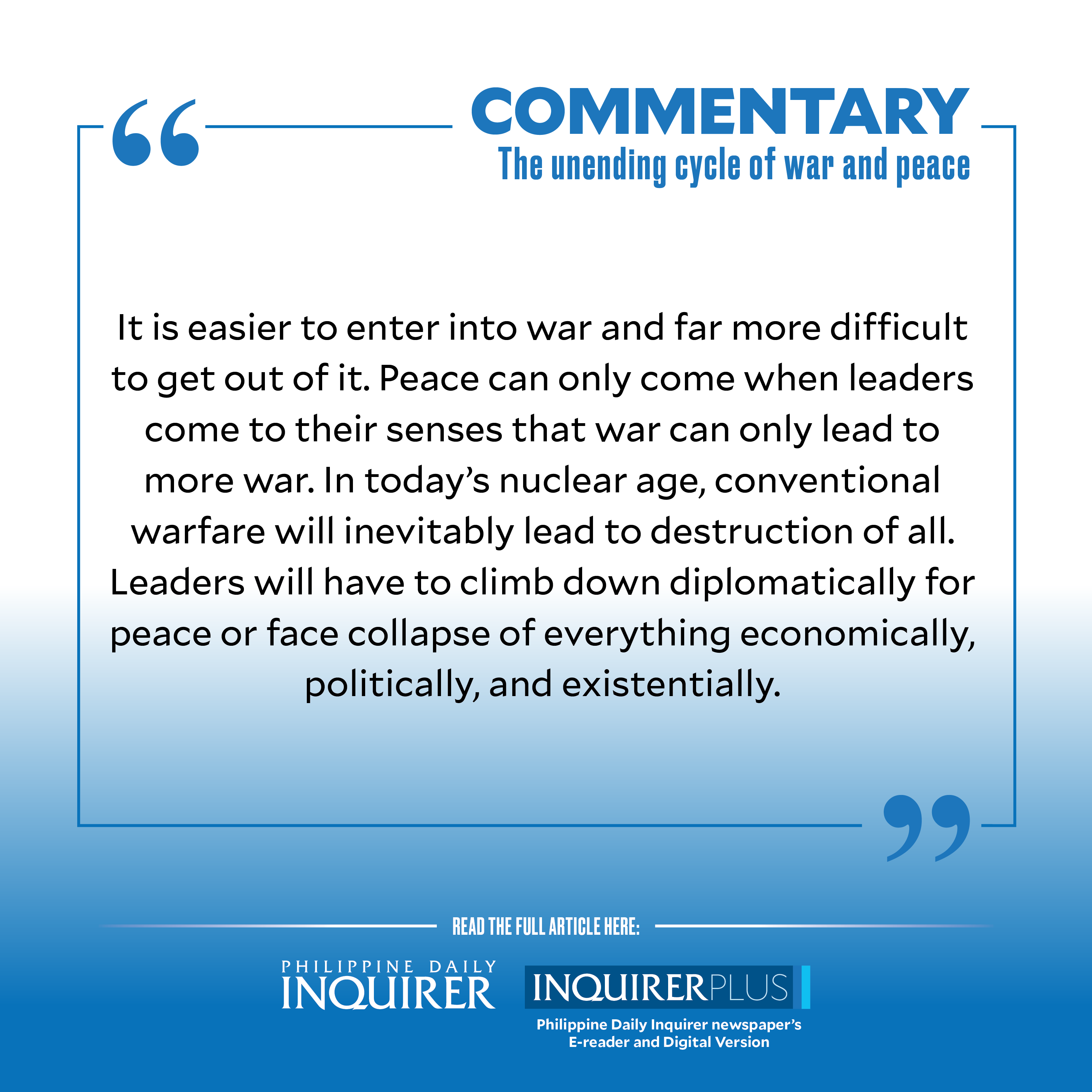The unending cycle of war and peace

Are we moving into an escalating phase toward war? With war returning to Europe with armed conflict in Ukraine, coups in Niger, Central Africa, amidst the hottest July in recorded history, the heating of climate and war is becoming a toxic mix.
The United States Director of National Intelligence’s 2021 report on Global Trends 2040 gloomily assessed the prospects: “In coming years and decades, the world will face more intense and cascading global challenges ranging from disease to climate change to the disruptions from new technologies and financial crises. These challenges will repeatedly test the resilience and adaptability of communities, states, and the international system, often exceeding the capacity of existing systems and models. This looming disequilibrium between existing and future challenges and the ability of institutions and systems to respond is likely to grow and produce greater contestation at every level.”
Article continues after this advertisementAt the heart of global tensions is the refusal of the West to accommodate the interests of the Rest, preferring a policy of containment. The recent Brazil, Russia, India, China, and South Africa (BRICS) summit in New Delhi only accentuated the growing divide between a rich West that is mostly white (except Japan) and the Rest. Both sides are enlarging themselves—the North Atlantic Treaty Organization (Nato) moving eastwards to the Pacific, whilst BRICS added six new members: Argentina, Ethiopia, Iran, Egypt, Saudi Arabia, and United Arab Emirates (UAE). Together, BRICS will account for 29 percent of world GDP and 46.1 percent of world population, versus 51.2 percent of world GDP for Nato plus Japan, which accounts for 13.6 percent of world population. BRICS today also accounts for 40.8 percent of the world’s oil and gas reserves, compared with 13.4 percent/12.8 percent for Nato/Group of Seven. BRICS is also more inclusive, as Ethiopia, Iran, Egypt, and UAE are not members of the Group of Twenty.
The really interesting point is that BRICS members are almost all ex-colonies or countries that historically experienced invasions from Nato members, including Japan. Japan is discharging its Fukushima radioactive water into the Pacific in a gesture of goodwill toward neighbors. If the water is nonradioactive and safe, why don’t they simply pump the waters into Japanese soil instead?
Small incidents like the Fukushima nuclear waste water hurting a crowded world describe what Austrian professor Friedrich Glasl considered in his nine-stage conflict escalation model. Glasl observed that conflicts arise in all organizations that evolve in three stages with three levels—win-win; win-lose; and lose-lose. In the win-win stage, level one is tension and hardening of views. Level two is debates and disagreements, but level three moves to actions. In stage two of win-lose for both parties, level four sees each party trying to get into coalitions, seeking allies to bolster their arguments, and bargaining positioning. Level five involves action that causes the other side to lose face. Level six then goes into actual strategies and threats, where the other side is seen as opponent, rival, or enemy. Level seven deteriorates into the lose-lose phase because one side thinks that its limited action will cause the other side to lose more. But this only invites tit-for-tat retaliation. Level eight attacks each other’s vital functions until the other fragments, surrenders, or collapses. Level nine is nuclear mutually assured destruction, where everyone loses.
Article continues after this advertisementThe Glasl model suggests that escalation can be reversed, provided both sides can find windows of opportunity to de-escalate, moving away from military action to diplomacy. The Ukraine war teaches the fundamental lesson that we must always look at the current situation from the other side’s perspective. Ukraine supporters see a violation of sovereignty as the absolute principle that they must defend to the death. The Russians argue that they are fighting for the existence of Russia as a sovereign state. Westward Nato movement reminds them that Russia was invaded twice in history by Western Europe—Napoleon and then Nazi Germany.
As the last two world wars demonstrated, wars have an entangled logic of rationality and emotion, with small incidents like the assassination of Austrian Archduke Franz Ferdinand leading to rapid mobilization and war. World War II was about Nazi Germany seeking revenge for the last defeat. It is easier to enter into war and far more difficult to get out of it. Peace can only come when leaders come to their senses that war can only lead to more war. In today’s nuclear age, conventional warfare will inevitably lead to destruction of all. Leaders will have to climb down diplomatically for peace or face collapse of everything economically, politically, and existentially.
There is no victory from nuclear war. Not even a return to status quo. This is why peace is the only real option. Asia News Network
—————-
Andrew Sheng is former chair of the Hong Kong Securities and Futures Commission.
—————-
The Philippine Daily Inquirer is a member of the Asia News Network, an alliance of 22 media titles in the region.
















